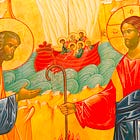What does 'Feed My sheep' really mean for Peter’s role in the Church?
By the same lake where Peter was first called, Christ gave him the threefold commission to feed His sheep and bestowed on him the primacy over the whole Church.

By the same lake where Peter was first called, Christ gave him the threefold commission to feed His sheep and bestowed on him the primacy over the whole Church.
Editor’s Notes
For the Feast of Ss Peter and Paul, we have chosen not to give Fr Coleridge’s commentary on the Gospel for the day, but rather on the moment when Christ the Lord bestows the primacy on St Peter.
Many believe that Christ made St Peter the Pope when he changed his name and talked about “the keys of the kingdom of Heaven.” In fact, the Church teaches that St Peter’s profession of faith gave rise to a promise of the primacy, which was ultimately bestowed following his threefold profession of charity:
We teach and declare that, according to the gospel evidence, a primacy of jurisdiction over the whole church of God was immediately and directly promised to the blessed apostle Peter and conferred on him by Christ the lord.
It was to Simon alone, to whom he had already said:
You shall be called Cephas, that the Lord, after his confession, You are the Christ, the son of the living God, spoke these words: Blessed are you, Simon Bar-Jona. For flesh and blood has not revealed this to you, but my Father who is in heaven. And I tell you, you are Peter, and on this rock I will build my church, and the gates of the underworld shall not prevail against it. I will give you the keys of the kingdom of heaven, and whatever you bind on earth shall be bound in heaven, and whatever you loose on earth shall be loosed in heaven.
And it was to Peter alone that Jesus, after his resurrection, confided the jurisdiction of supreme pastor and ruler of his whole fold, saying:
Feed my lambs, feed my sheep.
You can read more about this here:
In this part, Fr Coleridge tells us…
How Christ required this threefold confession of charity before he bestowed on him the primacy of the chief shepherd.
That Christ’s prophecy joined Peter’s mission to the cross, in love and final witness.
Why the Sea of Galilee became a divine image of the Church’s stormy path.
He shows us that Christ entrusted His flock to Peter not through rebuke, but through love and promise.
Last Words by the Lake
The Passage of Our Lord to the Father
Chapter XV
St. John xxi. 1-24; Story of the Gospels, § 178, 179.
Burns and Oates, London, 1892
Peter’s threefold confession
After the meal was finished, it became more plain than before that our Lord had His own purpose of indirect instruction in the whole. It was then that He made it clear that the whole was a significant and prophetic image of the work and future history of the chief Apostle.
Our Lord began by solemnly putting the question, ‘Lovest thou Me more than these?’ exacting, as it were, a threefold confession of his love to his Lord, in remembrance and as a compensation for his former denials in the Hall of Caiphas, when Peter had repeatedly professed that he did not know Him, and also in the Garden, when he had been so ready to assert his own superior faithfulness to all others.
It would be absurd to imagine that the interrogation was a trial to St. Peter, in the sense in which it might be looked upon as a public humiliation before conferring on him the great and responsible charge which was to make him the chief and universal Shepherd under our Lord Himself. For in the state in which the mind and heart of St. Peter had now for some time been as to his perfect faith and deep humility, it would only be a joy to him—in the presence of those brother Apostles, his superiority to whom in faithfulness to his Master he had been so foolish as to assert—to have to be reminded of his boastfulness and to withdraw the claim, for that was virtually done by the answer which he now gave to our Lord three times over.
If these questions put to him were all tests which gave him an opportunity of showing his humility, then afterwards, when our Lord spoke to him about feeding His lambs or feeding His sheep, the test was in truth a test of his love, and the three-fold repetition was in truth a continued appeal to the love of St. Peter, amounting to a solemn declaration on the part of our Lord by which He showed in the way in which Peter could best understand, that the care of the flock was committed to him by our Lord especially on the condition that he was to show therein his love for his Master by his faithfulness in its discharge.
And we cannot read the whole context without being led to see that what was said and done by our Lord and the Apostle really amounts to a promise on the part of our Lord, that He would take care that there was to be no failure in the condition implied on the side of either.
The scene at the lakeside is more than a moment of reconciliation—it is the divine institution of Peter’s office. But what does it mean, and why here, in this place?
Father Coleridge Reader is a labour of love. But curating, cleaning up and publishing these texts takes real work.
To keep this project going, and to make more of this treasury available, we rely on reader support. Some posts are reserved for members to sustain this mission.
We’re trying to keep something precious alive.
If you’ve benefited, consider joining us as a subscriber. It makes a real difference.


